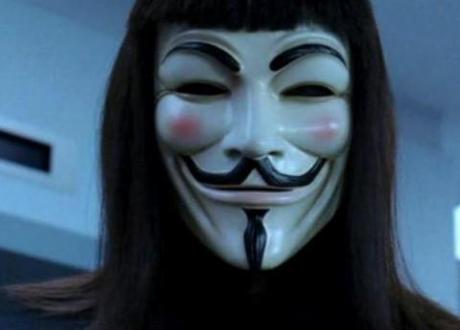
A still from the film V for Vendetta.
The sinister, grinning Guy Fawkes mask has become the symbol of protest across the world. Since the SOPA and PIPA debates in America about intellectual, the Anonymous collective, which uses the mask, has been showing its power; now, in Europe, the activists are protesting against a similar act – ACTA, the Anti-Counterfeiting Trade Agreement – over concerns that it will help censorship. Left-wing Polish legislators even donned the masks in protest, whilst Kader Arif, the European Parliament’s monitor for ACTA, has resigned, stating that he felt the consultation process was wrong.
Ironically, as The Verge pointed out, the masks are actually copies of a design owned by Time Warner, which is paid a licenscing fee for each sale of the mask, reported The New York Times. The design comes from a film based on the V for Vendetta strip, which was written by Alan Moore and illustrated by David Lloyd.
“Monstrous, unstable, comic metamorphosis is being used as a subversive unpicking of immobile unresponsive authority,” said Ian McCormick about the use of the mask on his Grotesque Observatory blog.
V for Validation. The BBC ran a piece by Alan Moore, author of the comic book series V for Vendetta, which contains characters who wear the Guy Fawkes mask. He said that in the 1950s, there was an “undertone of admiration” when people explained about Guy Fawkes to their children: whilst he wasn’t a hero, he certainly wasn’t a “villainous scapegoat.” He claims that the mask’s “charismatic grin” provides a “ready-made identity” for protestors, “embodying resonances of anarchy, romance, and theater that are clearly well-suited to contemporary activism.” We are also, according to Moore, living in a situation that resembles the “profligate court of Charles I”, with banks as an “untouchable monarchy.” The masks are “a reminder that unjust institutions may always be haunted by volatile 17th century spectres.” “Some ghosts never go away.” He’s happy about the appropriation: “If feels something like V for validation.”
Neutral position. ““It was political,” David Lloyd, the illustrator, told Ahram Online. “It was meant to tell something. It is a story about dictatorships everywhere.” He added “It simply is that neutral symbol of opposition, of resistance, and has effectively no political motivation behind it other than that; the motivation is added by those who use it.” The smile, he said, was accidental; but it certainly adds something to the design.
The power of the masses. No sooner was Acta signed, said The Economist, than almost every country that had signed it showed remorse. 30 countries are signatories, and it creates an “international regime” for penalising internet piracy. It’s a vague piece of legislation, intentionally so, as signatories are “left to draw up precise rules themselves.” But it’s “potentially draconian,” applying as it does to “unintentional use” of copyrighted material, and putting th eburden on website owners to make sure they “comply with laws across several territories.” “Internet activists used to be dismissed as a bunch of hairy mouse-clickers with little clout. Not any more.”

